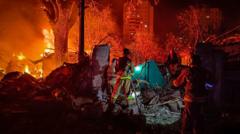Moscow has expelled two German journalists, amid accusations of Berlin shutting down the Russian state broadcaster’s office, escalating long-standing media conflicts between Russia and the West.
Moscow's Diplomatic Tensions Grow as German Journalists Are Expelled

Moscow's Diplomatic Tensions Grow as German Journalists Are Expelled
Retaliatory Measures Follow Allegations of Closure of Russian State Media Bureau
In a reciprocal move, Russia announced the expulsion of two German journalists working for public broadcaster ARD on Wednesday, accusing Berlin of closing the bureau of Russian state broadcaster Channel One. The German government has firmly denied these allegations, asserting that the journalists’ residency permits had simply expired, and has reiterated that Russian journalists can operate freely within Germany’s borders.
The Russian foreign ministry announced that Frank Aischmann and Sven Feller, the expelled German journalists, are to leave Russia by early December following grievances linked to Channel One's assertion that it had faced undue restrictions in Berlin. While local German authorities have been silent on the issue, Christian Wagner, spokesman for the German foreign ministry, described Moscow's actions as "disproportionate".
Channel One, funded by the Kremlin, has maintained a narrative of being targeted, claiming the German government orchestrated their closure. Yet, the German government clarified that it simply did not grant new permits as the residency requirements were not met. A spokesperson for the government stressed that journalism in Germany remains unrestricted.
Reflecting the tense media landscape, Russian officials have accused Germany of fostering an environment where misinformation undermines Russian-speaking citizens, notably highlighting fears over campaigns that could distort perceptions of Western policies. Previous instances of alleged biased coverage by Channel One have also drawn the ire of German diplomats.
As tensions rise amid ongoing sanctions against Russia due to the conflict in Ukraine, the expulsion of these journalists underscores the complex relationship between the Russian state and Western media. With the European Union imposing bans on Russian state media operations and Channel One being blocked from broadcasting in the EU since 2022, the future of media interactions between Russia and Germany appears increasingly precarious.
The Russian foreign ministry announced that Frank Aischmann and Sven Feller, the expelled German journalists, are to leave Russia by early December following grievances linked to Channel One's assertion that it had faced undue restrictions in Berlin. While local German authorities have been silent on the issue, Christian Wagner, spokesman for the German foreign ministry, described Moscow's actions as "disproportionate".
Channel One, funded by the Kremlin, has maintained a narrative of being targeted, claiming the German government orchestrated their closure. Yet, the German government clarified that it simply did not grant new permits as the residency requirements were not met. A spokesperson for the government stressed that journalism in Germany remains unrestricted.
Reflecting the tense media landscape, Russian officials have accused Germany of fostering an environment where misinformation undermines Russian-speaking citizens, notably highlighting fears over campaigns that could distort perceptions of Western policies. Previous instances of alleged biased coverage by Channel One have also drawn the ire of German diplomats.
As tensions rise amid ongoing sanctions against Russia due to the conflict in Ukraine, the expulsion of these journalists underscores the complex relationship between the Russian state and Western media. With the European Union imposing bans on Russian state media operations and Channel One being blocked from broadcasting in the EU since 2022, the future of media interactions between Russia and Germany appears increasingly precarious.



















